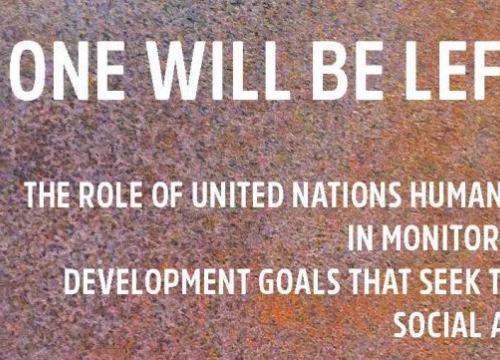New Publication on the Role of UN Human Rights Mechanisms in Monitoring the SDGs that Seek to Realize Economic, Social and Cultural Rights


Geneva Academy
15 January 2018
Our new publication No One Will Be Left Behind looks at the role of United Nations (UN) human rights mechanisms in monitoring the Sustainable Development Goals (SDGs) that seek to realize economic, social and cultural rights (ESCR).
The publication discusses the mutually reinforcing relationship between the SDGs and ESCR. ESCR can offer a legal foundation and guidance in the implementation of SDGs, and the SDGs may increase support for the realization of ESCR.
‘It is a call to build more bridges between the SDGs and human rights, to ensure that a human rights-based approach will be followed in the implementation of the SDGs, but also to make sure that equality, non-discrimination, participation and attention to the most vulnerable and those who are left behind are fully integrated’ underlines Dr Christophe Golay, author of the publication and Strategic Adviser on ESCR at the Geneva Academy.
A Need for Greater Accountability and Better Targeting
The publication highlights that the weakness of the 2030 Agenda lies in its limited accountability framework, based on voluntary national reviews and soft guidance from peers. In that context, UN human rights mechanisms – UN treaty bodies, the UN Human Rights Council and its Universal Periodical Review and Special Procedures – can give the SDGs a strong legal basis and provide a means of accountability via independent mechanisms. They can transform the SDGs’ beneficiaries into rights-holders, and UN Members States as those having legal obligations to implement the 17 goals.
‘UN human rights mechanisms have unique expertise in monitoring the realization of ESCR in UN Member States, promoting equality and non-discrimination and pushing for the adoption of laws, policies and programmes that target the most vulnerable and those who are left behind’ highlights Dr Golay.
The publication underlines that the international human rights system can provide guidance to states in the implementation of the SDGs, as well as to national, regional and international mechanisms established in the framework of the 2030 Agenda, notably the High-level Political Forum on Sustainable Development (HLPF).
‘If this expertise, accountability and targeting are not fully integrated in the SDGs’ architecture and implementation, I am afraid we won’t be able to reach these goals by 2030’ Dr Golay adds.
Concrete Recommendations on the Way Ahead
The publication draws attention to the need to fully integrate human rights into the implementation and monitoring of the SDGs, while also providing a set of concrete recommendations for states, UN human rights mechanisms, the Office of the UN High Commissioner for Human Rights and the HLPF as to how this might be done.
The Geneva Academy acknowledges the contribution by the International Solidarity Service of the Republic and State of Geneva which funded the publication and related background research.
Video
No One Will Be Left Behind
In this video, Dr Chistophe Golay, Strategic Adviser on Economic, Social and Cultural Rights (ESCR) at the Geneva Academy, presents our new publication No One Will Be Left Behind which looks at the role of United Nations human rights mechanisms in monitoring the Sustainable Development Goals (SDGs) that seek to realize ESCR.








